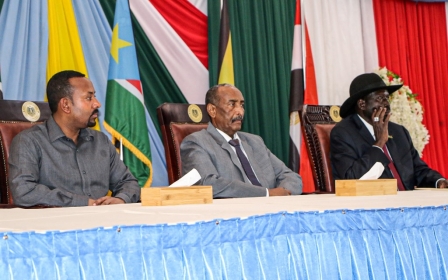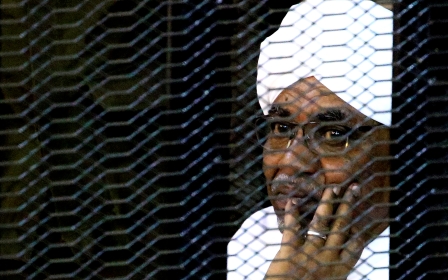Sudanese peace talks boosted by rebel group's return

Only in their second day, the prospects for peace talks between Sudanese rebels and the government have already swung between optimism and despair but could now be rescued after a major rebel group agreed to participate.
Rebel leader Abdul Aziz Alhilu's faction of the Sudan People's Liberation Movement-North (SPLM-N Alhilu) agreed to return to talks only a day after it walked away in protest against a government attack on its fighters in the southern state of South Kordofan.
SPLM-N Alhilu representative Amar Amoun told reporters in neighbouring South Sudan's capital Juba that the faction would participate in the talks after the government called a ceasefire in South Kordofan.
Who are Sudan's rebel groups?
+ Show - HideSRF: Sudanese Revolutionary Front
Rebel groups fighting in Darfur, Blue Nile State and South Kordofan formed the SRF in 2011 to unite efforts in talks with the government and have advocated for greater representation for minorities and marginalised communities during Sudan's post-Bashir transition
SPLM: Sudan People's Liberation Movement
Founded by the iconic rebel leader John Garang, who aimed for a democratic Sudan, the SPLM fought a war against the Sudanese state that eventually led to the secession of South Sudan in 2011. It is now South Sudan's ruling party, led by President Salva Kiir.
SPLM/N: Sudan People's Liberation Movement - North (Agar faction)
Garang's allies formed a northern branch of the SPLM after South Sudan's independence to focus on establishing the SPLM's vision of equality in Sudan. In 2011, SPLM-N chairman Malik Agar was removed by Bashir from his elected position as governor Blue Nile state and launched a rebellion that saw him take control of part of the region.
SPLM/N (Alhilu faction)
The group's vice-chair Abdel Aziz Alhilu splintered to create a faction focused on the grievances of South Kordofan, which borders South Sudan, and has become the most influential Sudanese rebel faction, fighting from the Nuba mountains and controlling large amounts of territory.
SLA/AW: Sudan Liberation Army - Abdul Wahid faction
In 2001 leaders from different indigenous Darfuri communities formed the Sudan Liberation Army to fight Bashir's government, claiming they represented Sudan's marginalised communities. The government was accused of carrying out genocide in its response, which used militias known as the Janjaweed to attack Darfuri communities.
Ethnic Fur, Khartoum-educated lawyer Abdul Wahid was the original chairman and now leads his own faction after the group splintered. Since 2016, Sudanese forces have been trying to clear SLA-AW fighters from the Jebel Marra area of Darfur.
SLA/MM: Sudan Liberation Army - Minni Minnawi faction
SLA commander Minni Minnawi, from the Zaghawa herder community, split from Abdul Wahid and formed his own faction. They have had very little presence in Darfur in recent years, basing themselves in neighbouring Libya.
JEM: Justice and Equality Movement
Founded based on grievances about inequality of power in Sudan and with more religious affiliation than other rebel groups, including leaders who were former members of the Islamist movement, JEM eventually became the most powerful Darfuri group. In 2008 it attempted to overthrow the government by storming Khartoum, only halted when they clashed with Sudanese forces in the capital's sister city Omdurman.
A dispute over which city to hold talks in was also settled by the Sudanese Revolutionary Front (SRF), a coalition of rebel groups from across Sudan, which agreed for them to remain in Juba.
Sources close to the talks told MEE that Egypt, the United Arab Emirates and Qatar, which has sponsored Darfur peace talks since 2011, had all offered themselves as hosts because of concerns that South Sudan lacks the financial capacity to support the peace process.
Stay informed with MEE's newsletters
Sign up to get the latest alerts, insights and analysis, starting with Turkey Unpacked
The SRF has, however, asked for the talks, which involve a range of Sudanese rebels groups and the country's new transitional government, to be postponed for at least 15 days.
South Sudanese chief mediator Tut Gatluak said he had received the request from the SRF.
The talks have been broken down into five negotiation tracks that cover the various regions represented by the participating rebel groups - many of them loosely coordinated under the SRF - including several from Sudan's western Darfur region, where the government has been accused of carrying out a genocide after 2003.
“We have met our brothers in the SRF and we talked about the peace track for Darfur and the leadership has confirmed that the talks will be in Juba. Now we will sit with the two sides to determine the agenda of the negotiations and the roadmap of this peace process,” said Gatluak.
Still fragile
South Sudanese political analyst Mathiang Cerelo told Middle East Eye that the talks are fragile and could still collapse.
He warned of potentially serious consequences to the decision to split the talks into various tracks, which has ultimately led to separate tracks, each having an ethnic dimension because of the different groups affected in each region.
He also said it was concerning that the talks had not been given much international support.
Following preliminary talks between the government and rebel factions in Juba last month, this week's negotiations have been attended by Ethiopian Prime Minister Abiy Ahmed, Ugandan President Yoweri Museveni, and senior representatives from the African Union, the European Union, Saudi Arabia, the United Arab Emirates and Egypt.
Middle East Eye delivers independent and unrivalled coverage and analysis of the Middle East, North Africa and beyond. To learn more about republishing this content and the associated fees, please fill out this form. More about MEE can be found here.




